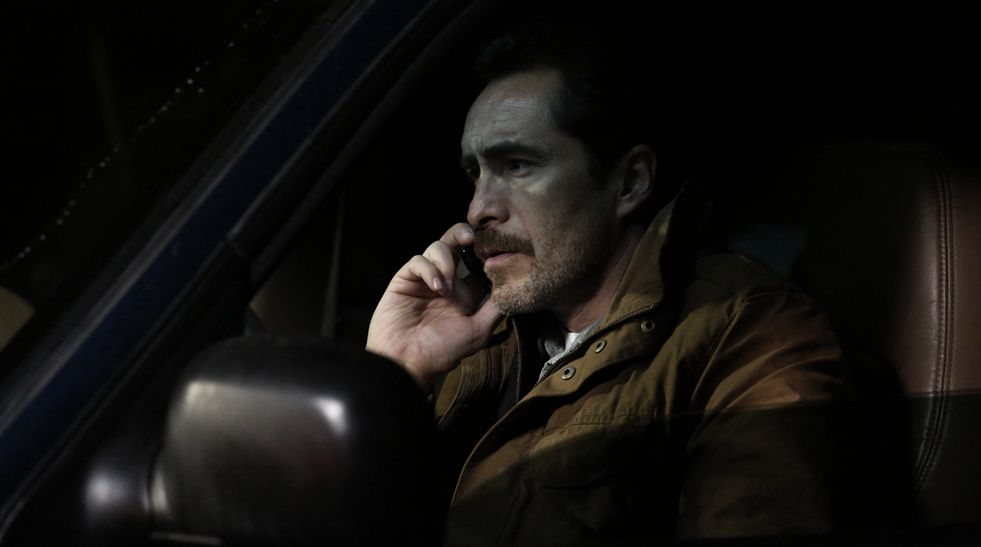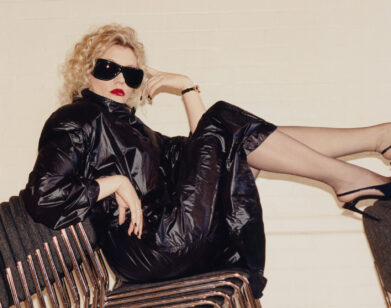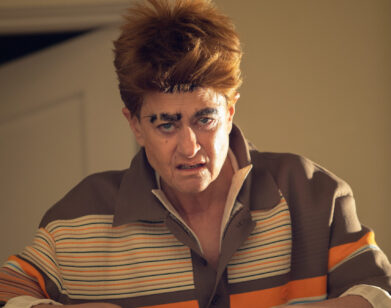Crossing the Bridge

ABOVE: DEMIAN BICHIR IN THE BRIDGE. PHOTO COURTESY OF FX.
Demian Bichir squeals with excitement over the phone. He’s driving to the set of his new FX show The Bridge, and he’s just spotted John Malkovich standing on a Los Angeles street corner. It is not, perhaps, the reaction you’d expect from an Oscar-nominated actor who is currently in theatres around the US opposite Sandra Bullock in The Heat. Born in Mexico City into a family of successful actors, Bichir’s original ambition was to become a soccer star. When that didn’t work out, he moved to New York and worked in a restaurant. He decided to pick up acting again in Los Angeles, and then Mexico, where he ended up starring in the highest-grossing movie in the history of Mexican cinema.
Though Bichir as an actor has dealt with immigration issues in the past—his character in A Better Life (2011), for example, is a single father and illegal immigrant in Los Angeles, who works tirelessly as a gardener for Hollywood’s elite—his new role in The Bridge is particularly relevant to politics in America today. The show revolves around an unusual murder on the bridge connecting El Paso, TX and Juarez, Mexico, where the bisected upper half of an American judge known for her anti-immigration views is found on one side and the legs of a Mexican girl on the other. Chihuahua State Police detective Marco Ruiz (Bichir) and El Paso PD detective Sonya Cross, played by Diane Kruger, are forced to assuage their various differences (and there are many, including Sonya’s undisclosed Asperger’s) for a common cause: solving the crimes of a ruthless serial killer. The Bridge is only one of many of Bichir’s upcoming projects; he has starring roles in soon-to-be released films Machete Kills and Don Hemingway, and he is working on writing and directing his own movie in the fall, titled Refugio.
EMILIA PETRARCA: Both of your parents were involved in acting when you were growing up, and both of your brothers are extremely successful actors. Did your parents encourage you to act? Or was it something you fell into?
DEMIAN BICHIR: My parents met each other while studying theater in Mexico City. There was no history of acting in either one of their families, though. They moved to Mexico City to pursue their careers as actors and then my father became a theater director and mom continued her career as an actress. Then my brothers and I were born and we began doing professional theater when we were kids. We used to go and play backstage and go with them to every square in Mexico City—every performance. My brothers and I just used to see it as a big game, and I guess it’s in our genes too. I was sort of the only rebel though, because I wanted to play soccer, but my father said, “I know you love soccer but theater loves you more.”
PETRARCA: And here you are!
BICHIR: [laughs] And here I am.
PETRARCA: The MTV Movie Awards in Mexico created a category one year titled, “Best Bichir in a movie,” and you and your brothers have even auditioned for the same parts. You may not be competitive now, but were you ever competitive growing up?
BICHIR: First of all, those MTV guys are just nuts. Only they could come up with a category like that. [laughs] I actually brought my dog into the ceremony because I told them, “Why don’t you just give it to my dog? He’s the best Bichir by far!” My brothers and I have been on the stage together before, though. We did a play together in Mexico. There’s no competition between us. We just love each other and support each other’s careers and are always happy when any one of us gets an important role. We’ve auditioned for the same characters, but that’s not only with my brothers—we’ve also auditioned with other actors and actresses that we love and respect very much. If they land a role that we’ve audition for, we celebrate. When anything good happens, we’re all happy.
PETRARCA: You came to New York when you were 22 years old to learn English. Did you take classes or did you pick things up on the streets or at the restaurant where you worked?
BICHIR: I didn’t go to school right away, but I did take three different courses in English and some speech courses. It’s funny, because one of the first things that my English teacher told us when I began studying in New York was, “You’re here because if you pick it up from the street, not everyone speaks good English.” And it happens all the time, anywhere. If you pick up Spanish from the streets, you’re not going to be able to speak it correctly. I’m still taking classes now for accents—my accent used to be even thicker than now [laughs].
PETRARCA: I’m from New York and I’m wondering if you picked up any New Yorker words or phrases when you were beginning to learn.
BICHIR: I think half of the English that I learned at first was all the vocabulary that you use in a restaurant, since I worked at one, like you said. I learned the vocabulary for the condiments and utensils and all the terminology that you use when you’re actually working in the back in the kitchen. I remember when I first went out looking for a job it was like Chinese to me; I couldn’t understand anything. I knew some English. I could defend myself and was able to survive the first weeks or months. I didn’t go to any private schools in Mexico—my brothers and I went to public schools—and you don’t learn much English there other than “the pencil is red” and “the window is open.” It’s pretty hard. The first time a customer at the restaurant asked for an ashtray I stood there at the table looking at him like, “What the hell is this guy talking about?” It was like one of those slow-motion moments in your life. I just stood there looking at his lips to try to pick up something. This was back when you could actually smoke in a restaurant. I didn’t understand until he actually made the gesture to ash your cigarette. And that’s when I learned what ashtray meant and now I’ll know it forever.
PETRARCA: It makes a lot of sense that “ashtray” would come up as a word often used in New York City.
BICHIR: That’s what I thought. It’s a tricky one. It’s two words!
PETRARCA: I don’t know how to say ashtray in any other language, so I would be stumped too.
BICHIR: Do you smoke?
PETRARCA: No, I don’t.
BICHIR: There you go; you don’t need it. [laughs]
PETRARCA: What’s it like switching back and forth between English and Spanish when you’re filming? Are there any particular scenes or emotions that you think are easier to portray in one language as opposed to another?
BICHIR: They say that the brain is a muscle and that one of the best exercises for any brain is learning another language and to switch from one to another as much as you can. Reading, speaking and writing—it’s been a tremendous exercise for me. I’ve found out that when I have trouble regarding any character or any particular scene in English, sometimes I’ll switch to Spanish and I’ll solve the problem that I’ve encountered. If I’m working in Spanish and I don’t know how to approach certain scenes or certain emotions, or how to say this and that, I just switch to English to try to solve it that way and it works.
PETRARCA: Do you like playing the good guy more or the bad guy more?
BICHIR: I like playing human beings—I don’t believe in good or bad. I don’t believe in black and white. I believe in different tonalities. I believe in different layers of emotions and states of mind. I believe in characters that can be human. I think my character Marco on The Bridge is an honest guy, but he’s no angel. He’s just another human being. He’s like any one of us—we can be fantastic or terrible. We can be angels or demons.
PETRARCA: Your character in A Better Life was the one put behind bars and now your character Marco on The Bridge is the one putting people behind bars. You’ve played detectives before, but was there any particular research that you did? I know that for A Better Life you spent time driving around Los Angeles and gardening like Carlos does in the film. Did you do any method acting for this role?
BICHIR: I was lucky enough to… Wait, is that John Malkovich? I think that was John Malkovich! [laughs] Sorry, we just saw John Malkovich waiting on a corner try to cross the street.
PETRARCA: Oh wow, that’s so funny.
BICHIR: Yeah! Well, it’s actually really funny because my younger brother Bruno worked on a play in Mexico that he directed. We couldn’t talk to him because we’re driving now, but man, that was funny. Anyway, I was lucky because I’ve played cops before, so I have very extensive training, not only with police procedures but also with handling weapons of any caliber. Anything else you need to know is in the script that we have. There’s also the news; there’s a lot of information that you can find if you look into the serious sources.
PETRARCA: The Bridge is the first American premium television show to be substantially spoken in Spanish and a lot of promotion has been done in Spanish. Do you think the show will build any bridges between Mexico and the United States?
BICHIR: It’s very interesting that we’re showing complete scenes in Spanish. I don’t think I’ve seen that in American television. I also haven’t seen any shows going as deep as we’re going with The Bridge into this complex relationship between the United States and Mexico and what it’s like to share a border. I’m surprised—why has no one done it before? I think it’s what has seduced people so far, even before we’ve premiered the show on the air. It’s fascinating how it works and how well it works. There are so many stories you can tell. It will be there forever too. I wouldn’t be surprised if you started to see series from many other networks that go in this direction as well.
PETRARCA: Jude Law was one of the people who convinced you to do the show while you were both filming Dom Hemingway in Europe. Diane Kruger, who plays your partner Sonya, is from Germany and The Bridge is based off of a European show that focuses on a bridge between Sweden and Denmark. Although the show is focused on the US and Mexico, do you think it will have an impact abroad?
BICHIR: It’s hard to say. I was doing Don Hemingway in the south of France and in London when I got the offer to do the show and I remember talking with Jude Law and Richard E. Grant about the project, and they were familiar with it because it had been a big hit in Europe. It was Jude and Richard who were like, “Wow, man! That’s incredible,” because it’s such a big show over there. But I didn’t know anything about it—they told me how great it was. I didn’t want to watch anything or take a look at it, though, because I didn’t want to bring any ideas into this project; I wanted to start from zero.
PETRARCA: You would never know that Diane Kruger is German. She plays a very convincing Southern girl.
BICHIR: I know! She’s fantastic. I think she has the most difficult role in the series, without a doubt, and she’s does such a great job. She’s approaching her character with grace and precision. It’s a joy to watch her work.
PETRARCA: The bisection of the body on the bridge in the pilot episode is clearly a metaphor for the bisection that exists within U.S.-Mexico border towns and for their inhabitants. Has there ever been a point in your life where you felt this bisection or polarity that is discussed in the show so much?
BICHIR: Well, I think that’s what’s really fascinating about my character Marco because he has to straddle between these two worlds. And he’s good at it—he’s really good at it. He plays with all the players. He plays high-stakes chess. He can walk through fire and never get burned by it. I think this duality is perfectly represented between Sonya and Marco too—Diane’s character and my character—because that’s exactly how the United States and Mexico are. We couldn’t be more different; we have different backgrounds, different cultures, different languages—different everything. But we’re still tied together because we share the same problems. We have big issues in common and we need to learn how to work together and solve them together.
PETRARCA: Now is obviously a really important moment in American politics for immigration with the massive immigration overhaul being passed through the Senate. A Better Life was described as being social realism, rather than political. Would you say that The Bridge is political?
BICHIR: I wish we had that power—the power to change not only the rules but also a whole country and the world. But it’s kind of romantic. I think it’s possible, but it’s difficult. The Bridge is not a political statement and it’s not a documentary; this is drama and it’s fiction. But I believe A Better Life had something to do with bringing the subject into the public eye. I remember bringing the film to the White House. I took it to the Capital Building and talked about it and it got a lot of attention. The bill being passed to the House couldn’t be better timing for The Bridge. The title says it all. The title is exactly what the immigration bill should be about—it’s about building bridges, not walls.
THE BRIDGE PREMIERES TONIGHT, JULY 10 ON FX.






